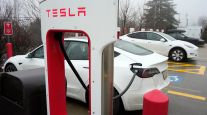Contributing Writer
Ford Plans Electric Version of Transit Cargo Van

[Stay on top of transportation news: Get TTNews in your inbox.]
Ford Motor Co. plans to produce an electric version of its Transit cargo van.
The commercial vehicle is part of the automaker’s strategy to develop a wide range of electric vehicles. Last year it introduced the Mustang Mach-E and showed a prototype of an electric F-150 pickup truck. Ford also plans to work with electric truck and SUV developer Rivian to produce an electric SUV under its Lincoln luxury brand.
The electric Transit will be sold in the U.S. and Canada in the 2022 model year. It will release the vehicle specifications and other details closer to production. But the automaker said it will come in the typical commercial configurations including cargo van, cutaway and chassis cab. The electric version also will have three roof heights and three body lengths.
Ford projects that electric vehicles will make up 8% of new U.S. auto sales in 2025. The company plans more than $11.5 billion in electrification investments through 2022.
Host Seth Clevenger went to CES 2020 in Las Vegas and met with Rich Mohr of Ryder Fleet Management Solutions and Stephan Olsen of the Paccar Innovation Center to discuss how high-tech the industry has become. Listen to a snippet above, and to hear the full episode, go to RoadSigns.TTNews.com.
“Commercial vehicles are a critical component to our big bet on electrification,” said Jim Farley, Ford’s chief operating officer. “The Ford Transit isn’t just about creating an electric drivetrain, it’s about designing and developing a digital product that propels fleets forward.”
Ford said the Transit is the world’s best-selling cargo van and America’s best-selling commercial van brand for the last 41 years.
Starting to move its large commercial market to electric vehicles and other advanced technology is an important strategic move, said Stephanie Brinley, the automotive analyst at IHS Markit.
“Entering in the near term with a commercial vehicle that plays to Ford’s strengths can put the company in a stronger position as EV demand eventually catches up,” Brinley said. “While Ford has not addressed this potential, it stands to reason that an EV Transit may also eventually have a role to play in Ford’s autonomous vehicle programs and mobility services.”
The automaker’s truck and van fleet sales have grown rapidly in recent years as it piggybacked on the booming e-commerce sector’s need for delivery vehicles. Ford sold 240,529 vans last year.
Producing an electric delivery van will help consumers reduce their carbon footprints and help businesses that are setting sustainability goals, the automaker said. It also will help satisfy increasingly stringent global emissions and noise reduction goals.
“The world is heading toward electrified products and fleet customers are asking for them now,” Farley said.
Ford believes electric commercial vehicles will prove to be efficient business tools. They have lower operating expenses and less scheduled maintenance than internal combustion engine vehicles, the automaker said. Additionally, electric vehicle fleets may benefit from federal, state and local electric vehicle tax rebates, access to high-occupancy vehicle lanes and free parking.
Additionally, electric vehicles also can operate where vans with internal combustion engines cannot, including indoors. They also work in environments with limited ventilation, and at night in areas with restrictive noise ordinances.
Want more news? Listen to today's daily briefing:





